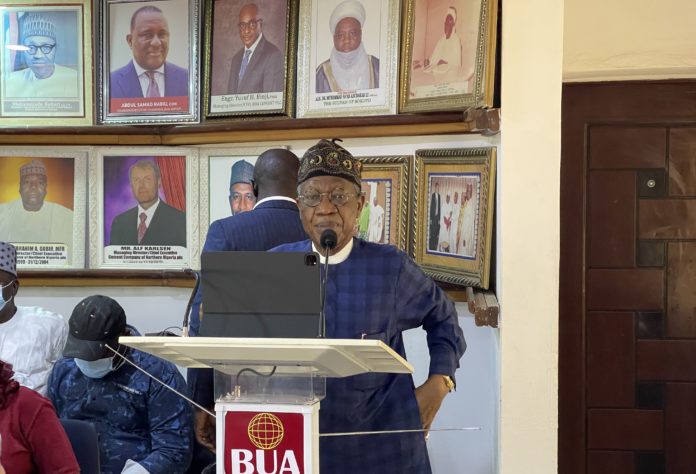Remarks by the Honorable Minister of Information & Culture, Alh. Lai Mohammed during his Media Visit to BUA Cement (Sokoto Plant) May 26Tth 2022
Good morning gentlemen. We are here today in continuation of our tour of public and private sector projects across the country, projects that are impacting positively on the lives of our people. We are here with about 30 journalists drawn from the print, electronic and social media, as well as from public and private media. We also have a documentary team here with us.
2. Within the past two months alone, we have visited four projects, the latest being this BUA Cement facility here in Sokoto. Others are the Dangot Petroleum Refinery and Petrochemicals as well as the Dangote Fertilizer in Lagos, which we visited on April 3rd 2022; the Lekki Deep Sea Port in Lagos, which we visited on May 4th 2022 and the Duchess Hospital also in Lagos, which we visited on May 10th 2022.
3. All these projects are beneficiaries of the conducive business environment created by the Administration of President Muhammadu Buhari, under the auspices of the Presidential Enabling Business Environment Council (PEBEC), which has implemented over 150 reforms since 2016, as well as the Companies and Allied Matters Act, 2020 (CAMA 2020) – Nigeria’s most significant business legislation in three decades. The result of this favourable business environment is the birth of new businesses such as the 5 Million tonnes per annum (mtpa) BUA Cement here in Sokoto; the $2.5 billion Dangote Fertilizer Plant that will produce 3 million tonnes of Urea every year; the 650,000 barrels per day oil refinery due to open later this year; the Lekki Deep Sea Port, one of the most modern sea ports in West Africa and the 5,000 barrels per day Modular Refinery in Ibigwe, Imo State.
4. It is interesting to note that the conditions that have made BUA cement to flourish, especially since 2015 when this Administration assumed office, include the fact that BUA was granted Pioneer Status, the ban on importation of cement, government’s divestment from the cement industry and of course backward integration policy. Thanks to these conditions, BUA Cement has recorded a 300 per cent increase in production between 2015 and now. That’s from 3.5 million Tonnes per annum in 2015 to 11 million tonnes per annum now. For its part, the sokoto plant is operating at over 90 per cent of installed capacity. Because of its location, which is just 100 kilometers to Niger Republic, the plant exports to Niger and Burkina Faso, earning Nigeria much needed forex. Please note that only excess is exported, especially during the raining season. Other facts include that the company produces all year round, loading between 250 and 270 trailers per day. The plant has 700 trucks for cement distribution
5. The 3 Million tonnes per annum line (IV) of the BUA Cement facility that we have just visited was commissioned by President Muhammadu Buhari in January this year, and takes the combined
installed capacity of the factory’s Lines 2,3 and 4 to 5 Million tonnes per annum. This is one of the most modern cement plants anywhere. It has gas analyzers used in regulating carbon emissions released into the atmosphere; air purifying mechanisms set up to enhance the quality of air released from the cement manufacturing process. In fact, the plant has filters capable of capturing 99.9% of dust in order to make the environment healthy and conducive for the workers and customers alike. The plant is the first cement plant in Nigeria to use Liquefied Natural Gas to generate 50MW of power, thereby replacing coal in its kiln. This has made the plant environmentally friendly to also curb climate change. I am sure when the AKK gas pipeline project is completed, it will drastically reduce the time and cost of transporting gas, which is currently being trucked from Port Harcourt to the plant. At least 20 trucks of LNG are brought here daily from Port Harcourt. Imagine the costs and the logistic challenges involved in this.
6. Of course this plant is also a job creator. As the Managing Director said, there are 443 permanent staff and, together with all other ancillary jobs, the total is about 10,000 jobs.
7. Please permit me to commend the Chairman of BUA Cement, Alhaji Abdul Samad Rabiu (and his entire team), for his undying belief in Nigeria. There is no better indication of BUA’s support for the government’s economic diversification and job creation agenda than the company’s massive investments in Nigeria. In the last five years, BUA has completed four new cement plants of similar capacity in different parts of the country and is set to complete two more plants soon. It is expected that total production for BUA CEMENT will amount to 17 million tonnes per annum by 2023.
8. In 2020, BUA Group consolidated its cement operations and listed BUA Cement Plc on the Nigerian Stock Exchange with a total combined installed capacity of 8 million tonnes per annum and a market capitalization of N2.5 trillion, making it the second largest cement producer in the Nigeria with 25 percent of the market; the largest cement producer in the North West, South South and South East of the country and the largest private employer of labour in the North-West. BUA Cement (Sokoto plant) is primarily engaged in the business of quarrying, extracting, processing and dealing in limestone as well as the manufacture and supply of cement.
10. Of course, BUA Cement has also invested heavily in Corporate Social Responsibility. The company is involved in the provision of health services, scholarship for students, provision of housing, roads, electricity, etc.





